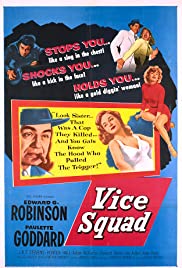
VICE SQUAD
US, 1953, 89 minutes, Black and white.
Edward G. Robinson, Paulette Goddard, K. T. Stevens, Porter Hall, Adam Williams, Edward Binns, Barry Kelley, Lee Van Cleef.
Directed by Arnold Laven.
In the television era, there have been so many series, often based on real-life, of police precincts, of cops and their daily rounds…
This film comes from the years when television was developing and there was still room for a movie about a police precinct. This is a day in the life of…
It opens with some action, criminals stealing a car, confronted by the police, the shooting, a timid funeral director having a rendezvous at a brothel being the witness. It emerges that the criminals are planning a bank robbery.
All is well with Edward G. Robinson in charge, a no-nonsense officer, sympathetic to the people he meets, shrewd in his assessment of characters, effective in action. He has a staff of officers who do interviews, go out on the beat, do door-to-door investigation – though none of the characters emerges as more significant than another.
An informer lets the chief know that there is a bank robbery in plan, to be carried out by the criminal who did the shooting of the officer. This means that the police can plant undercover officers in the bank and thwart the robbery. Acting on the word of the informer as well as information from the Madame from an escort service (legal), Paulette Goddard in a tough role, they are able to track down an associate and put pressure on him, get the fearful funeral director to identify the shooter, and finally roundup the criminals in an abandoned warehouse where they have taken a hostage from the bank.
There are a couple of other cases including a fake count and a paranoid man who feels that he sees television images all over him in the street – recommended to find a witness, the suggestion being the psychiatrist at the hospital.
The director is Arnold Laven, his second film, who also directed the Paul Newman Korean film, The Rack, as well as Slaughter on 10th Avenue. However, his main work was in television for over 30 years.
1. Life in a precinct? The 1950s? Police precincts and personnel at the time, organisation and management, detection, stakeout, arrests? A day in police life? The later television series by comparison? Black-and-white photography, sense of realism?
2. Los Angeles, the city, streets, the bank, apartments, hideouts and warehouses, the interiors, on the water? The musical score?
3. The setting of the scene, Barkis and Pete Monte, stealing the car, the police observing, ringing in, confrontation, the murder? The funeral director, his rendezvous with Vicki, telling his wife he was out of town, being a witness, the policeman’s call for help, his going over, being taken by the police?
4. Edward G. Robinson as Barney, as a person, in charge, efficient, relating to the authorities, Ginny as his assistant, with the other police, arriving, beginning the day, at his desk, the calls, the cases? The wounded policeman in hospital? His concern?
5. The range of police, the officers, identifiable but not standing out? On the job, interviews, with the suspects, on-the-job, investigations, skills, use of guns?
6. The guns, American police, the shootouts?
7. Barney and the television interview and having to leave early?
8. Barkis, being in prison, out, the connection with Marty, collaboration with Pete, the other members of the gang? The murder, the meeting in the planning of the robbery, Marty not feeling it was right, but staying? The discussions, the practicalities?
9. The informer, in handcuffs, his memory lapses and remembering, the information about the bank plan? The police going to the bank, undercover and security?
10. Mona, a character, her escorts, legal, giving information, the phone calls to Barney, the delays, his getting her picked up, her getting the information?
11. The funeral director, deceiving his wife, apprehensive, wanting his lawyer, his fears, the lawyer and his advice, that it was too dark to see, getting out, the setup for the assault on the policewoman, in and out of the precinct, his possessions, signing documents, the exasperation of the lawyer, confronting Barney? The funeral director transferred, to confront Marty, his finally getting away? The relationship with Vicki, the police asking her mother, her buying the fur, being taken in, the pressure on the funeral director because of her presence?
12. The story of the count, the woman apprehensive about her mother being deceived, his being taken in on identity issues, the police hospitality, lunch, ringing in the expert, exposing him as a fake? His wanting the fare back to Chicago?
13. The case of the man in the street, the television putting shadows all over him – Barney’s gentle handling of the case, advising him to get the doctor at the clinic as his witness?
14. The robbery, being interrupted, the shots, Pete in the car and the escape, his getting the boat, caught, Barkis taking Carol as the hostage, her parents fear and Barney’s working with them, in the warehouse, Pete getting the boat?
15. Carol, getting free, the pursuit in the dark of the warehouse? Marty in the interrogation, his giving information? Barney saving Carol? Confronting Barkis and the shooting?
16. The end of a day’s work?